Taking Back Timmins: Indigenous outreach workers use life experience to tackle homelessness
The last instalment of our series Taking Back Timmins offers an in-depth look at frontline workers who tend to the city’s homeless community using their first-hand experiences and Indigenous culture.
We start with Jeffrey Hookimaw, who heard a homeless client was in need of shoes. He decided to purchase a pair with his own money at a local discount store.
“What made you want to do that?” I ask him.
“To help out another person,” Hookimaw says.
“I was in that same situation because I was homeless, too, before. It’s just the right thing to do.”
Hookimaw is part of an outreach team called the Mushkegowuk Fire Keepers.
Their base is nestled in the local homeless shelter. The team stock up on food, overdose kits and other essentials, and venture out into the city streets in pairs, looking for people in need of help.
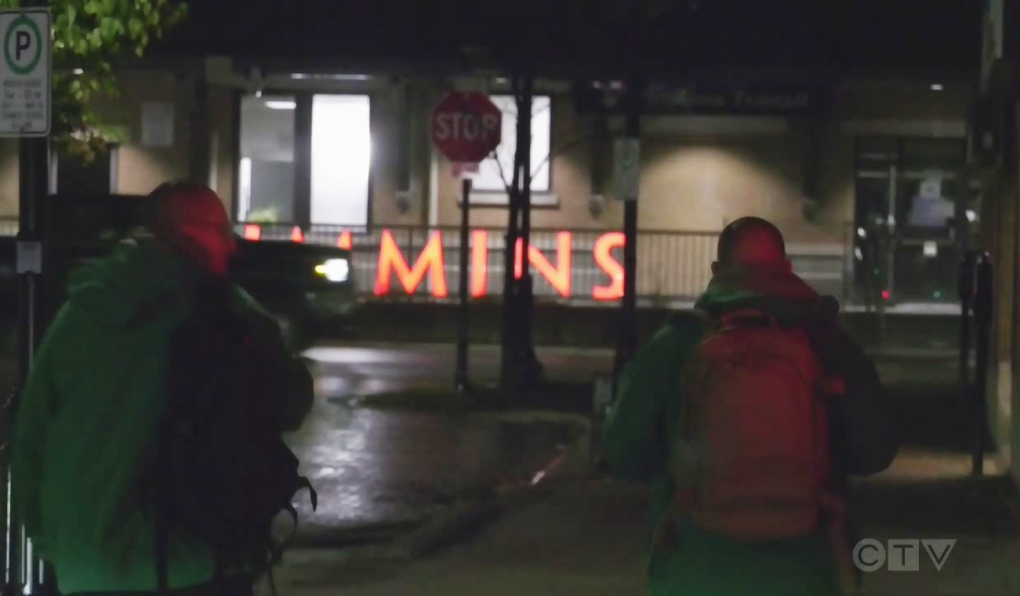 The last instalment of our series Taking Back Timmins offers an in-depth look at frontline workers who tend to the city’s homeless community using their first-hand experiences and Indigenous culture.
The last instalment of our series Taking Back Timmins offers an in-depth look at frontline workers who tend to the city’s homeless community using their first-hand experiences and Indigenous culture.
TAKING TO THE STREETS
One pair head out on foot, while the other take a vehicle to cover more area.
“We usually look for needles, we find people,” says Joseph Linklater, alongside Hookimaw on the sidewalk.
“We found someone overdosing a few times and we had to NarCan them and call an ambulance.”
The two encounter a woman huddled in an alleyway and offer her a sandwich and water. They tell me she’s intoxicated.
The outreach patrol has been operational since 2020 and received a one-year funding boost in August from the City of Timmins, allowing for daily evening patrols from 4 p.m. to midnight.
Almost every outreach worker on the team has stories of struggles that led them to want to give back to the community.
Hookimaw became homeless after moving from Moosonee to Timmins at 18.
Spending most of his life on the streets -- along with addiction issues and a jail record -- he one day decided it was time to stop.
“It got to the point where I had to be honest with myself that drugs were really taking over my life, where I couldn’t manage it myself,” he explains.
“I worked on the issues like, you know, my self-esteem, the confidence. I worked on the shame, from all the stuff I did in my past.”
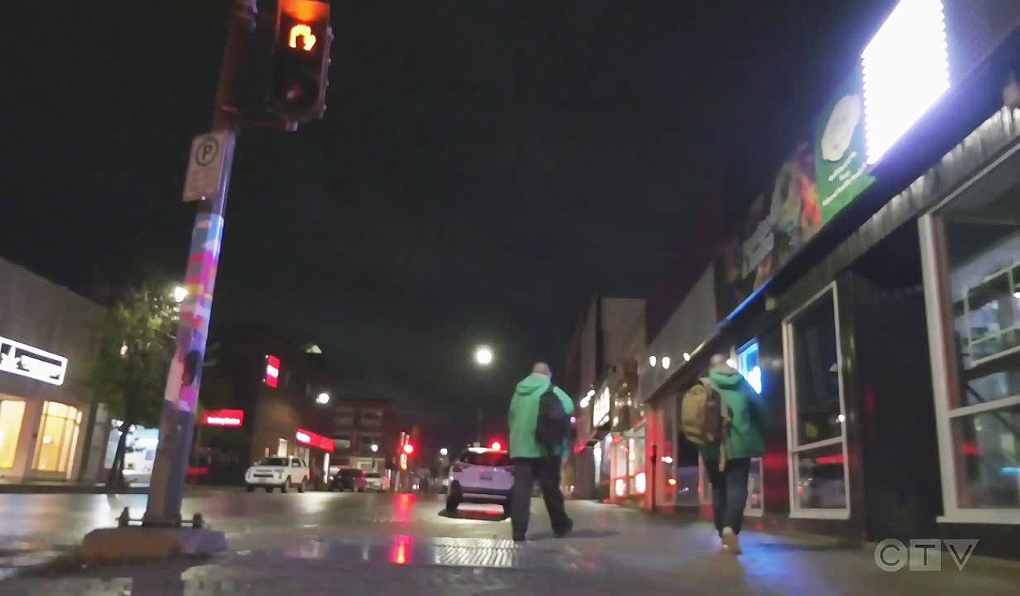 The last instalment of our series Taking Back Timmins offers an in-depth look at frontline workers who tend to the city’s homeless community using their first-hand experiences and Indigenous culture.
The last instalment of our series Taking Back Timmins offers an in-depth look at frontline workers who tend to the city’s homeless community using their first-hand experiences and Indigenous culture.
'I JUST WANT THEM TO KNOW THEY'RE NOT FORGOTTEN'
Hookimaw says with the help of his family, he discovered a kinder side to his personality. And as he bettered himself, he felt the need to bring others up with him.
“I helped my brother. I was able to be his support, he was on the street, too,” says Hookimaw.
His brother’s name is Steve.
“Now he’s working at the same office where I work at now. I have two kids. I want them in my life, I want to be in their lives.”
Being an outreach worker, Hookimaw sees the streets with fresh but familiar eyes. He’s on a mission to show people that they can lift themselves out of their situations.
“I know how it is to be out there, to be hungry, to be wet, to be cold in the middle of winter, in the stairways, just to warm up. I know where it leads to,” Hookimaw says.
“I just want them to know they’re not forgotten, that there’s a way out and a better way to live. I honestly believe that, knowing that I changed, that they’re able to, too.”
PROVIDING NECESSITIES AND SUPPORT
Part of the work is making sure clients have the basic necessities and access to further help. From late August to the end of October, the patrol connected with more than 1,400 people, three of whom required basic wound care.
Emergency services had to be called twice.
Workers referred more than 200 people to various services and placed 10 people on a housing list. The foot patrol encountered two people seeking shelter under a raised parking lot.
One of them, Kyle Nichols, says he’s been homeless on and off for four years. Having outreach workers check in is comforting, he says.
“It’s amazing to have. There’s a lot of people more in need than me, like, people that would die if they didn’t come around,” Nichols says.
“They pick up a lot of the stuff, too, that you don’t want your kids to have and see. And food too … socks, toothbrush, toothpaste. Things that you lose or gets taken from you. Nobody has money to replace that.”
The outreach workers also distributed about 80 opioid overdose kits and cleaned up more than 700 needles in the downtown area in two months.
The workers take an Indigenous-based approach to helping the city’s predominantly Indigenous homeless community.
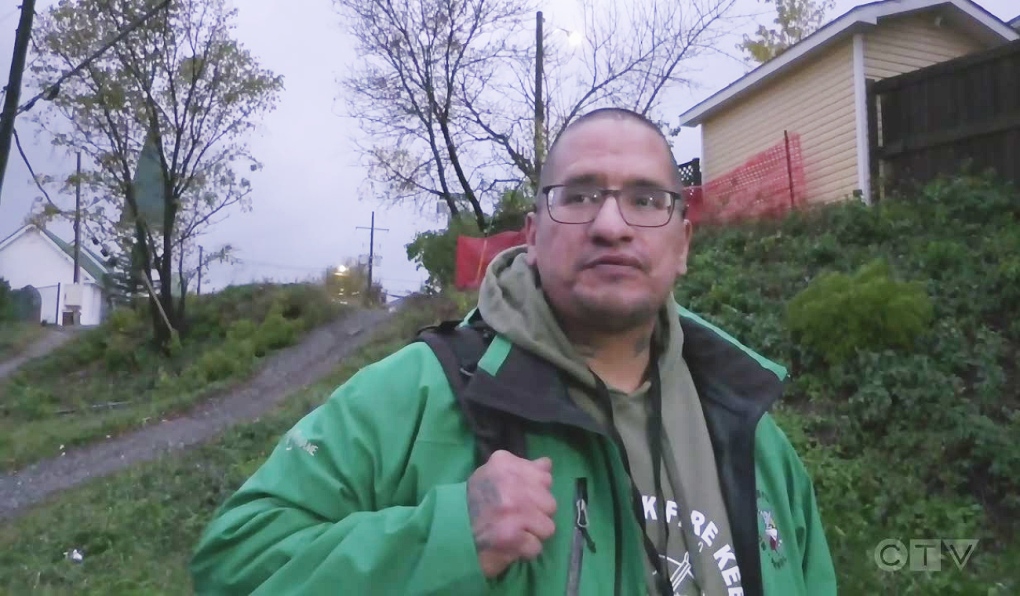 The last instalment of our series Taking Back Timmins offers an in-depth look at frontline workers who tend to the city’s homeless community using their first-hand experiences and Indigenous culture.
The last instalment of our series Taking Back Timmins offers an in-depth look at frontline workers who tend to the city’s homeless community using their first-hand experiences and Indigenous culture.
HEALING TO HELP THE HOMELESS
Kyndra Wesley-Trapper joined the team after working with homeless and drug-addicted people at other agencies.
She’s from Moose Factory Island, across the river from Moosonee, and is a member of Attawapiskat First Nation.
All of her grandparents attended residential school and she inherited their pain, going on to live a tumultuous life of her own.
“I was dealing with a lot of trauma, which I connected to with drugs and alcohol. I went for treatment, I relapsed a bunch of times, I (overdosed) too,” Wesley-Trapper explains.
“I went through treatment, I went to therapy, I did trauma work. And today, I would say, I’m almost four years sober and five years from opiates.”
Wesley-Trapper says her experience allows her to build a deeper connection and trust with her clients.
“You understand, you know which place they’re coming from, you know where intergenerational trauma comes from,” she says.
“We know how to talk to them.”
Though Wesley-Trapper admits she wants to help people in those situations, since they stirred up old personal wounds.
“I used to get triggers from them,” she says.
“I would always turn to drinking or something. Today because I’m sober … I’m able to be stronger and be with them, and listen with more compassion.”
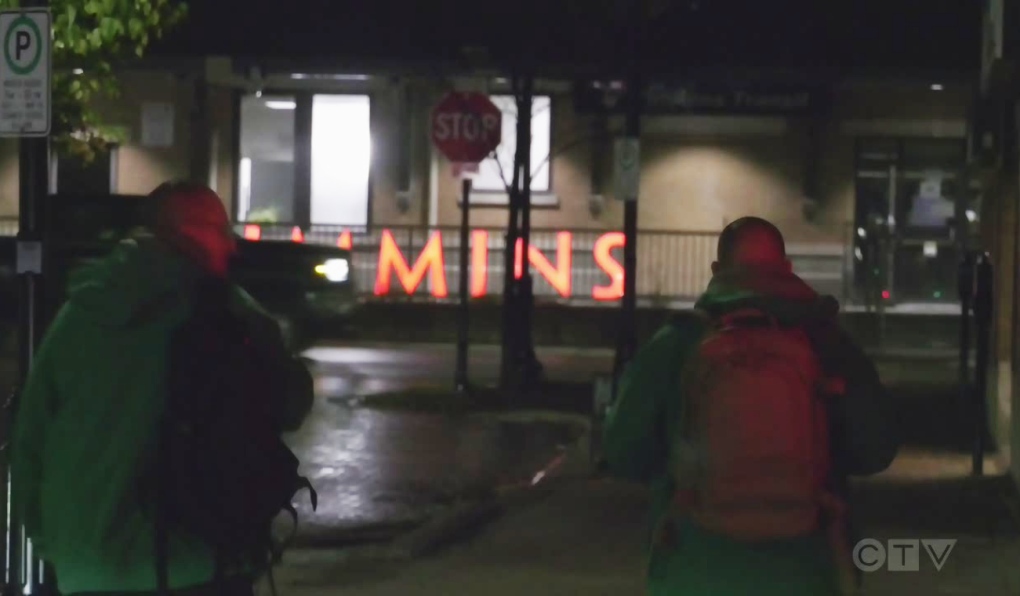 The last instalment of our series Taking Back Timmins offers an in-depth look at frontline workers who tend to the city’s homeless community using their first-hand experiences and Indigenous culture.
The last instalment of our series Taking Back Timmins offers an in-depth look at frontline workers who tend to the city’s homeless community using their first-hand experiences and Indigenous culture.
‘I WISH THERE WAS MORE PEOPLE LIKE THEM’
And that seems to work with clients, as I observe people responding well to the workers’ presence.
The sense is that they know these people are here to help.
“I think the work that these folks are doing is excellent,” says Tyler Guindon, a homeless client.
“They’re actually out there, on the street, doing some physical work and helping people. I like to see that and I wish there was more people like them out there.”
While the outreach team was hoping to be able to operate overnight, current staffing levels are limiting patrols to cut off at midnight.
But outreach worker Taylor Vincent says the level of service he and his team are able to provide has been critical in ensuring the homeless community is looked after.
“Just take us away and you’ll see these people being a lot more miserable, a lot more bitter and a lot more resentful of the system,” he says.
“We’re sort of easing the pain, allow them to heal a bit more … get their lives back together, when it seems like the whole world’s against them. If I can help that in any way, then I’m glad to do it.”
MORE SUPPORTS STILL NEEDED
Nichols, one of the homeless men I spoke with, says there’s sense of hopelessness that comes with trying to get off the streets.
Like they’ll just fall back down, without a proper support system.
“Especially for people that are, like, big time mental illness and stuff like that. Already have a hard enough time doing day-to-day stuff,” he says, adding that the city needs more transitional housing, to ease people back into society.
“It’s not like they don’t know those life skills, it’s just like, ‘OK, do all those life skills that you used to know all at once.’ It’s like if you live on a deserted island for five years, you’re not gonna be able to come back and do business life and all that.”
Hookimaw says sharing how he clawed himself out of that place of despair tends to inspire people to do the same.
They find encouragement in his redemption story, he says, proof that recovering from homelessness and addiction is possible.
“For them to come up and approach me and say, ‘How did you get out of it? I’m really thinking of changing,’” Hookimaw adds.
“Just that thought process alone, thinking like, ‘Hey, maybe it’s possible for me,’ gives them hope.”
What Nichols would like to see is the city be more accommodating of homeless people, as they struggle to improve.
He says allowing people to take shelter from the rain and the cold in public or even empty commercial spaces would be a start.
“All I’m trying to do is dry my things so that way I can put them in garbage bags and they’re not soaking wet,” he says.
“If I go in the bathroom for 20 minutes, it doesn’t mean that I’m doing something I shouldn’t. Maybe I’m washing my face or washing my balls for the first time in two weeks because there’s nowhere else I can do it.”
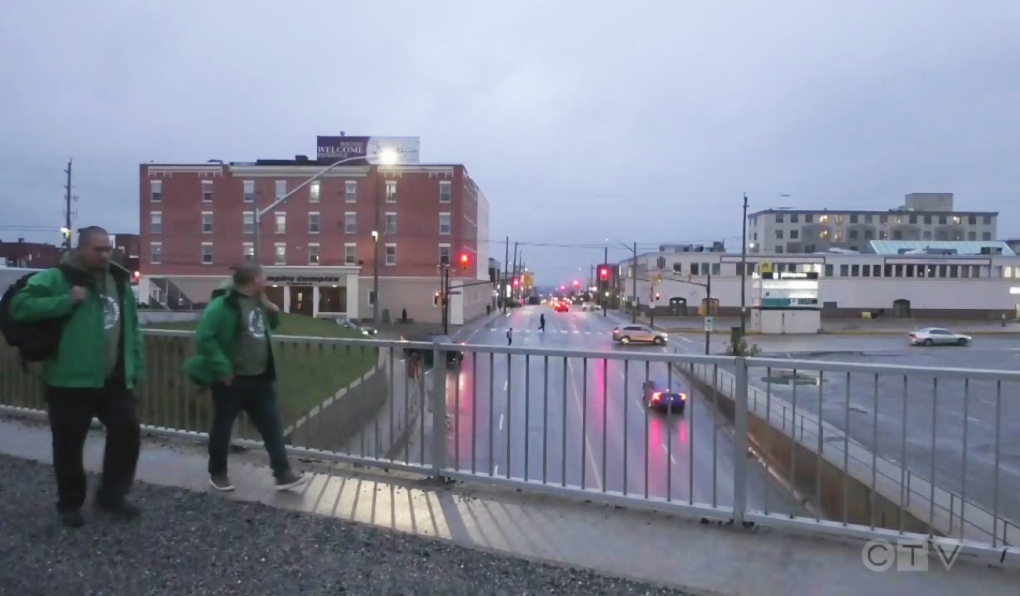 The last instalment of our series Taking Back Timmins offers an in-depth look at frontline workers who tend to the city’s homeless community using their first-hand experiences and Indigenous culture.
The last instalment of our series Taking Back Timmins offers an in-depth look at frontline workers who tend to the city’s homeless community using their first-hand experiences and Indigenous culture.
A PLACE TO FEEL SAFE
One of the places the homeless community can rely on is the Fire Keepers’ drop-in centre.
The workers welcome walk-ins and even offer to give people rides to the centre. They’re greeted with some relief from the weather, a warm drink and a chat while workers try to find them better shelter and services.
Wesley-Trapper and Vincent find a woman in distress and offer to take her there, explaining that intake workers can find her shelter.
“They can help you get a bed, here at Living Space, too, and provide housing.”
“Really?”
“Yeah.”
Upon arrival at the drop-in centre, the woman remarks on the warmth of the vehicle, after spending a night in the cold.
“It’s so warm in here, I don’t want to get out.”
Wesley-Trapper says the centre is a judgement-free space.
“They come here and they feel it’s a safe place for them to come to, and I think that’s what they need,” she says.
“If they feel like they’re safe, they’ll open up more.”
OVERCOMING PREJUDICE
As people in the city grow frustrated with the level of visible homelessness and drug use here, these outreach workers say patience, understanding and human decency are the best way through these issues.
Responding to disparaging comments that have been voiced in the city towards the homeless community, the workers say that attitude will not fix the underlying problems.
“Maybe you feel like you need something to blame because your life is not going particularly one way, but we’re all in this together,” says Vincent.
“We just need to come together and just not hate each other so much. And just work on the problems.”
“It’s really a reflection, too,” Wesley-Trapper adds.
“You know how people judge and that’s all they see? Accept them for who they are and you just try your best.”
MORE WORK AHEAD
While the outreach program’s expanded operating hours are fairly new, the workers say it has made a difference.
They have a unique understanding of the city and its people in crisis that they say will be valuable in making lasting change.
But they admit it can be frustrating work, especially dealing with people facing mental health issues or who are lost in their trauma.
Their additional funding expires next August and they hope there will be enough of a visible impact to be able to continue helping people.
- Download our app to get local alerts on your device
- Get the latest local updates right to your inbox
“I know it’ll take time to see results,” says Hookimaw.
“But I’m willing to go through all that hardship. It’s worth it, just to see somebody get sober and love life, like I do now.”
CTVNews.ca Top Stories

opinion Tom Mulcair: Prime Minister Justin Trudeau's train wreck of a final act
In his latest column for CTVNews.ca, former NDP leader and political analyst Tom Mulcair puts a spotlight on the 'spectacular failure' of Prime Minister Justin Trudeau's final act on the political stage.
B.C. mayor gets calls from across Canada about 'crazy' plan to recruit doctors
A British Columbia community's "out-of-the-box" plan to ease its family doctor shortage by hiring physicians as city employees is sparking interest from across Canada, says Colwood Mayor Doug Kobayashi.
'There’s no support': Domestic abuse survivor shares difficulties leaving her relationship
An Edmonton woman who tried to flee an abusive relationship ended up back where she started in part due to a lack of shelter space.
Baseball Hall of Famer Rickey Henderson dead at 65, reports say
Rickey Henderson, a Baseball Hall of Famer and Major League Baseball’s all-time stolen bases leader, is dead at 65, according to multiple reports.
Arizona third-grader saves choking friend
An Arizona third-grader is being recognized by his local fire department after saving a friend from choking.
Germans mourn the 5 killed and 200 injured in the apparent attack on a Christmas market
Germans on Saturday mourned the victims of an apparent attack in which authorities say a doctor drove into a busy outdoor Christmas market, killing five people, injuring 200 others and shaking the public’s sense of security at what would otherwise be a time of joy.
Blake Lively accuses 'It Ends With Us' director Justin Baldoni of harassment and smear campaign
Blake Lively has accused her 'It Ends With Us' director and co-star Justin Baldoni of sexual harassment on the set of the movie and a subsequent effort to “destroy' her reputation in a legal complaint.
Oysters distributed in B.C., Alberta, Ontario recalled for norovirus contamination
The Canadian Food Inspection Agency has issued a recall due to possible norovirus contamination of certain oysters distributed in British Columbia, Alberta and Ontario.
New rules clarify when travellers are compensated for flight disruptions
The federal government is proposing new rules surrounding airlines' obligations to travellers whose flights are disrupted, even when delays or cancellations are caused by an "exceptional circumstance" outside of carriers' control.

































